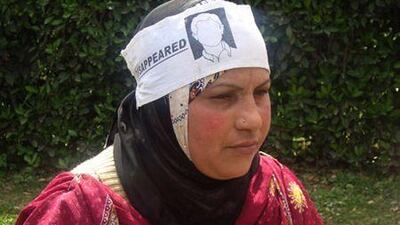SRINAGAR, INDIA // "He left home for his routine work, but never returned, that's all," Tahira Begam said about her husband's whereabouts. Seven years ago this month, Tariq Ahmad Rather, then 21, disappeared from Peernia village in Uri, Baramulla. He was believed to have been picked up by the Indian security forces.
Mr Rather and Ms Begam had been married for four years and had three children when he went missing. Ms Begam lodged a missing persons report with the local police the day after he left. "I searched for him everywhere. Some people told me they had seen him in Udamapur army camp. Others said he was picked up by SOG [Special Operations Group, a government militia that was disbanded in 2003]. I knocked at every door, but couldn't find him," Ms Begam said of her husband, who made a living doing masonry work. "He had no interest in politics. After marriage he was always worried about his family. I don't know who took him away."
Ms Begam is gripped with renewed anxiety after a human rights organisation this month claimed to have found thousands of unmarked graves in various mountainous regions of Kashmir. Most of the remains, according to the rights activists, were those of innocent civilians accused of being foreign militants and killed by Indian armed forces. "Unmarked grave doesn't mean nobody is buried in it or it doesn't belong to someone who was killed. I pray he's not one among the buried and is alive, but God only knows the reality," Ms Begam said.
Since the beginning in the early 1990s of a separatist movement against Indian rule in the region, rights groups say, an estimated 8,000 people have disappeared. The government, however, puts the number of missing persons at about 3,700; most, it says, crossed the Line of Control into Pakistan-administered Kashmir for arms training. The International People's Tribunal on Human Rights and Justice, a Kashmir-based rights group, made public a report on December 2 claiming to have found unmarked graves in 55 villages across three districts - Kupwara, Handwara and Baramulla - bordering Pakistan-administered Kashmir during a three-year survey.
The report documented 2,700 unmarked and mass graves containing 2,943 bodies, including three or four women. The report said 177 of the unmarked graves contained between two and 17 bodies. "Our report doesn't claim who is in each grave. We are not saying the graves belong to people who have forcibly disappeared or belong to Kashmiri or foreign militants. The question is who is buried in the graves," Khurram Parvez, a liaison officer for the tribunal, said.
The group said it examined 49 cases involving people whom the government had declared foreign militants then killed during encounters with Indian armed forces. It found 41 were civilians, one was a local militant and seven remained unidentified locals. The group said the dead men had been locals who were arrested, killed in custody or in "staged encounters" the Indian army claimed were true fights with foreign militants.
"Government and police don't deny the presence of graves, but claim they belong to foreign militants killed during encounters with Indian forces. We have investigated some cases and found most of them to be innocent Kashmiris. Based on the sample, one can assume the same about other graves," Mr Parvez said. Indian security forces in the region are protected from prosecution under the Armed Forces Special Powers Act, which was imposed soon after insurgency erupted in 1990 in the Kashmir valley. The act allows anyone of any rank in the army, paramilitary force or police to shoot, arrest or search without warrant and to kill on suspicion alone.
Kashmir's law minster, Ali Mohammad Sagar, said the number of people who have disappeared in the past two decades is often exaggerated, and the government is duty-bound to ascertain the facts. "We have asked the district commissioners of these districts to look into the claims. It's a matter of concern and at an appropriate time government will take a decision to probe these cases," Mr Sagar said.
Most of the unmarked graveyards are near hamlets along the mountainous ranges of the valley. People in these villages said the local police would hand over the bodies for burial. Atta Mohammad, a gravedigger from Bimyar in Uri town, said he buried 203 bodies between 2002 and 2006 on a hillside on the banks of the Jhelum River, which flows into Pakistan-administered Kashmir a few kilometres away. "These dead bodies were handed over by the local police mostly during night. The dead bodies were beyond recognition, with slit torsos and their faces mutilated," Mr Mohammad said.
Taj Mohiuddin, a legislator from Uri, where the rights group found several unmarked graveyards, said: "These are the graves of militants who have been killed during encounters with security forces. There is no question of missing people buried in these graves. They are in Pakistani Kashmir receiving arms training." foreign.desk@thenational.ae

